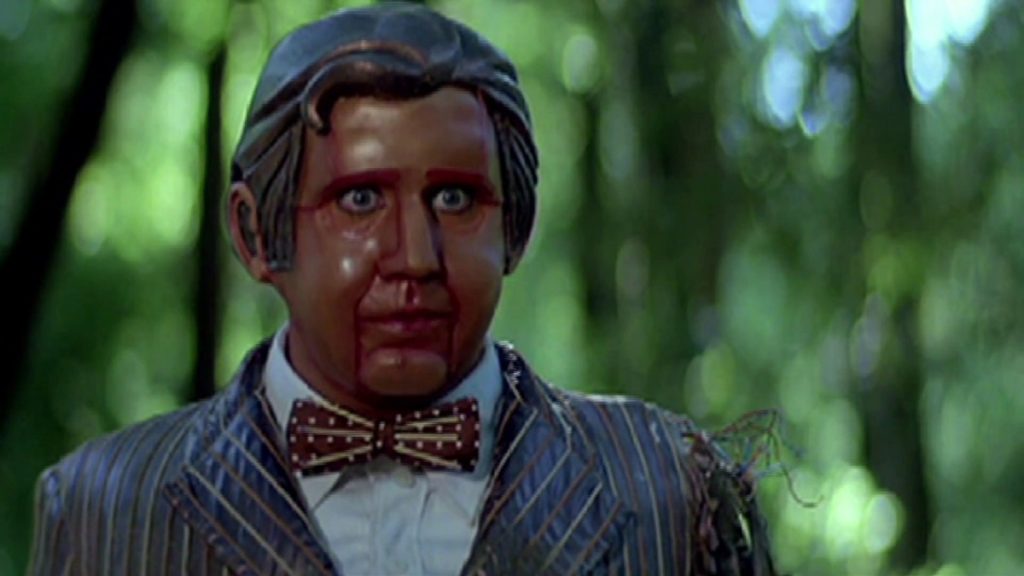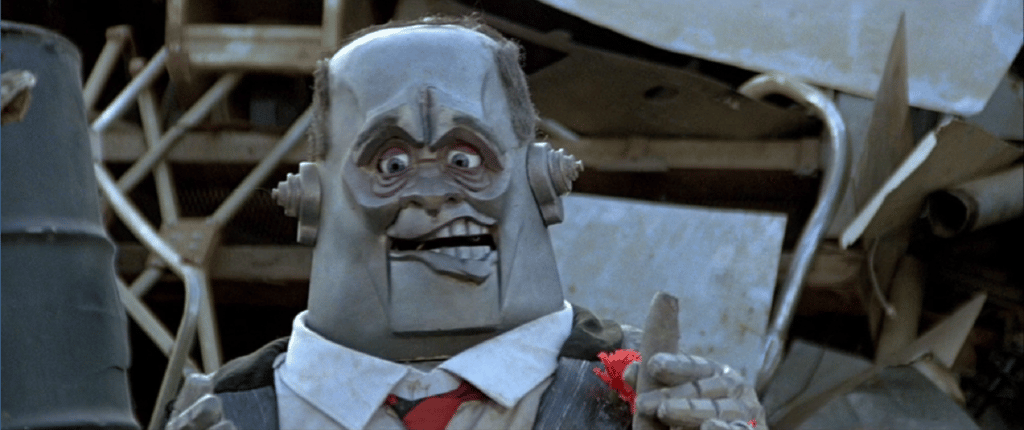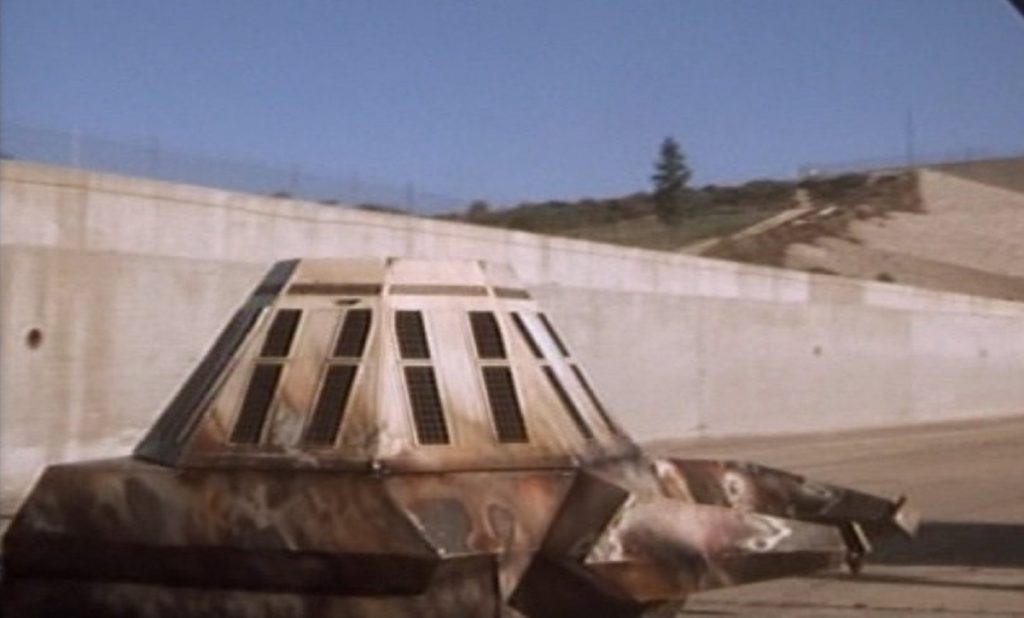A re-evaluation of Andy Kaufman’s biggest film role leads to more or less the same conclusions.
Looking back, the holiday movie season of 1981 was an undeniably exciting time to be heading out to the multiplex. Unspooling in theaters at that time were such films as Reds, On Golden Pond, Ragtime, Neighbors, Pennies from Heaven, Sharky’s Machine, Ghost Story, Absence of Malice, Chariots of Fire, Four Friends, Rollover, Time Bandits, and a reissue of Cinderella—all intelligent, ambitious and well-made movies. Even if they didn’t all pay off critically or financially initially, they have managed to stand the test of time.
One exception to this otherwise stellar lineup was Heartbeeps, the infamous Andy Kaufman vehicle that tanked at the box office, drew some of the worst reviews ever penned, and which has thus far resisted any call for some kind of reevaluation. It is rare that one ever comes across a genuinely perfect cinematic object, but that is precisely what Heartbeeps is in its own perverse way.
Here is a film where it seems every possible bad creative choice was selected and executed with ghastly precision. This is the kind of project producing duo Bialystock & Bloom might have selected if they went into film. Though I can assure you when it was all over, absolutely no one involved remarked, “Where did we go right?”

The whole debacle began when Kaufman, who was going back and forth between his enormously popular work as the lovable Latka on the hit series Taxi and his increasingly bizarre and controversial experiments in dadaist comedy, pitched Universal Studios on a film project. Together with cohort Bob Zmuda, they wrote a script based around his notorious alter ego, Tony Clifton. Evidently not self-referential enough with just Clifton, it also would find him playing a deranged and monstrous version of himself. The screenplay was hilarious, but deeply weird. You can sometimes find it online and it is worth the effort. It was the kind of thing that Charlie Kaufman would perfect a couple of decades later. The notion that any studio would have even contemplated making it back then boggles the mind.
However, the executives at Universal had a more pressing concern. Although a star from Taxi and his appearances on Saturday Night Live, Kaufman’s big-screen career to date at that point consisted of minor roles. Neither his roles in Larry Cohen’s God Told Me To nor Marty Feldman’s religious satire In God We Trust proved that he could carry a film on his own or attract a paying audience. Therefore, they proposed that Kaufman do another movie first to prove his viability as a film star. If that worked, then the Clifton project could theoretically proceed. That, in a nutshell, is how he came to appear in Heartbeeps. You have to wonder what those other scripts were to make this seem like the ideal project for him.
For those who never saw the film or successfully purged it from their memories, Heartbeeps unfolds in the distant future of 1995. It features Kaufman as Val Com 17485, a valet robot who arrives at a factory to await repairs. There he meets Aqua Com 89405 (Bernadette Peters), a robot designed for hostess duties. The two quickly fall into what humans call “love” and decide to escape and start a new life for themselves.
You have to wonder what those other scripts must have been like to make all involved think that this was the ideal project for [Andy Kaufman] to tackle.
Much of the abbreviated running time is dedicated to the two robots wandering in search of a place to live and an all-important power supply. They build a small robot child out of spare parts named Phil to demonstrate their love. Catskill, a robot stand-up comedian (with a voice supplied by Jack Carter)–who, in a prime example of the comedic sensibility on display, is always shown sitting down–soon joins them. What passes for action and drama comes when a malfunctioning police robot known as Crimebuster. It goes off in pursuit of the two fugitives, causing all sorts of mayhem along the way.
Considering Kaufman’s ability to shift characters in the blink of an eye, you might think Heartbeeps would take advantage. Perhaps have him play a robot whose malfunctions cause him to shift personalities constantly. That might not have saved the film, but it certainly would have livened things up a bit.
Instead, his only mode suggests Latka after being hit in the back of the head with a tire iron. He ends up getting submerged in the character’s utter innocuousness. To make matters worse, the makeup that he and Peters wore to create their robotic looks was unyielding. It strands these two normally expressive performers looking as if they had been flash-frozen the entire film.

Although the complete waste of Kaufman’s talents remains the greatest crime committed by Heartbeeps, it is hardly the only one. John Hill’s screenplay unfolds like a barely feature-length (78 minutes) version of the cheapo animated television specials that used to pop up on television to sell crap to kids. In his follow-up to the cult favorite Rock n Roll High School, director Allan Arkush inexplicably gives the proceedings the kind of ponderous pacing that one might expect in a film by Ingmar Bergman at his most anguished and not in something revolving around two robots falling in love.
Fans of Arkush’s Roger Corman days will appreciate him slipping favorite performers like Paul Bartel, Mary Woronov, and Dick Miller into a major studio project. Unfortunately, not even they can do much of anything with the material. At least in those Corman films, things actually happened from time to time.
When the studio finally saw Arkush’s initial cut, they were appalled and responded by firing him and recutting it themselves. They even went as far as to remove the contributions of Jerry Garcia, who supplied the sounds for Phil’s voice. When it was finally released, reviewers were appalled, moviegoers stayed away in droves, and any chance of Kaufman being allowed to do The Tony Clifton Story went down the drain along with any hope of him becoming a movie star.
While the Kaufman cult has grown by leaps and bounds… not even his most devout fans are willing to try to make the case for Heartbeeps.
While the Kaufman cult has grown by leaps and bounds since his tragically early death in 1984, not even his most devout fans are willing to try to make the case for Heartbeeps. Hell, even I cannot make a claim for it as some kind of overlooked masterpiece. Me, the guy who has tried to suggest to you that films like Nothing but Trouble and Buddy Buddy are better than their reputations might suggest.
So instead, I would like to conclude this essay by citing the only three relatively notable things that one could say about Heartbeeps.

- It was not the worst film to come out that season, as a viewing of the interminable Chevy Chase vehicle Modern Problems will reveal. (Do not under any circumstances attempt to confirm this analysis for yourself, lest you go mad as a result.)
- The film received an Oscar nom for Stan Winston’s makeup effects (though it would lose to Rick Baker’s groundbreaking work from An American Werewolf in London), which means that it technically qualifies to appear on TCM’s annual 31 Days of Oscar programming cycle.
- Following the film’s release, Kaufman went on Late Night with David Letterman and facetiously offered to personally refund the ticket cost to anyone who paid to see it. Letterman responded, “you’d better have change for a twenty,” inspiring perhaps the only genuine laugh to be connected with the strange, sad beast known as Heartbeeps.
Heartbeeps Trailer:
Read next: The Spool's Best New Releases
Streaming guides
The Best Live TV Streaming Services With Free Trial
The praises of live TV streaming services don’t need to be further sung. By now, we all know that compared to clunky, commitment-heavy cable, live TV is cheaper and much easier to manage. But just in case you’re still on the fence about jumping over to the other side, or if you’re just unhappy with ... The Best Live TV Streaming Services With Free Trial
How to Watch Power Book III: Raising Kanan Season 3
Season 3 of the hotly anticipated Power spin-off, Power Book III: Raising Kanan, is arriving on Starz soon, so you know what that means: it’s the ’90s again in The Southside, and we’re back with the Thomas family as they navigate the ins and outs of the criminal underworld they’re helping build. Mekai Curtis is ... How to Watch Power Book III: Raising Kanan Season 3
How to Watch Doctor Who: 60th Anniversary Specials
Ladies and gentlemen, we’re so back! To celebrate Doctor Who’s 60th anniversary, the BBC is producing a three-episode special starring none other than the Tenth/Fourteenth Doctor himself, David Tennant. And to the supreme delight of fans (that would be me, dear reader), the Doctor will be joined by old-time companion Donna Noble (Catherine Tate) and ... How to Watch Doctor Who: 60th Anniversary Specials
Which Netflix Country has Interstellar?
Maybe you’ve just seen Oppenheimer and have the strongest urge to marathon—or more fun yet, rank!—all of Christopher Nolan’s films. Or maybe you’re one of the few who haven’t seen Interstellar yet. If you are, then you should change that immediately; the dystopian epic is one of Nolan’s best, and with that incredible twist in ... Which Netflix Country has Interstellar?
Which Netflix Country Has Each Movie of The Hunger Games?
For whatever reason, The Hunger Games series isn’t available in the same countries around the world. You’ll find the first and second (aka the best) installments in Hong Kong, for instance, but not the third and fourth. It’s a frustrating dilemma, especially if you don’t even have a single entry in your region, which is ... Which Netflix Country Has Each Movie of The Hunger Games?
How to Watch ESPN With A Free Trial
One of the major concerns people have before cutting the cord is potentially losing access to live sports. But the great thing about live TV streaming services is that you never lose that access. Minus the contracts and complications of cable, these streaming services connect you to a host of live channels, including ESPN. So ... How to Watch ESPN With A Free Trial
How to Watch Paramount Network With a Free Trial
To date, Paramount Network has only two original shows on air right now: Yellowstone and Bar Rescue. The network seems to have its hands full with on-demand streaming service Paramount+, which is constantly stacked with a fresh supply of new shows. But Yellowstone and Bar Rescue are so sturdy and expansive that the network doesn’t ... How to Watch Paramount Network With a Free Trial
How to Watch WE TV With a Free Trial
Previously “Women’s Entertainment,” We TV has since rebranded to accurately reflect its name and be a more inclusive lifestyle channel. It’s home to addictive reality gems like Bold and Bougie, Bridezillas, Marriage Boot Camp, and The Untold Stories of Hip Hop. And when it’s not airing original titles, it has on syndicated shows like 9-1-1, ... How to Watch WE TV With a Free Trial
How to Watch Comedy Central With a Free Trial
It’s no coincidence that many of today’s biggest comedians found their footing on Comedy Central: the channel is a bastion of emerging comic talents. It served as a playground for people like Nathan Fielder (Fielder For You), Ilana Glazer and Abbi Jacobson (Broad City), Tim Robinson (Detroiters), and Dave Chappelle (Chappelle’s Show) before they shot ... How to Watch Comedy Central With a Free Trial
How to Watch FX With a Free Trial
You’d be hard-pressed to find a bad show airing on FX. The channel has made a name for itself as a bastion of high-brow TV, along with HBO and AMC. It’s produced shows like Atlanta, Fargo, The Americans, Archer, and more recently, Shogun. But because it’s owned by Disney, it still airs several blockbusters in ... How to Watch FX With a Free Trial
How to Watch A&E With A Free Trial
If you’re a fan of true crime and insider docu-shows like The First 48 and Court Cam, then you’re probably already familiar with A&E. The cable channel is home to other reality TV gems like Hoarders, Duck Dynasty, and Storage Wars (they’ve moved on to spin-offs like Road Wars, Customer Wars, and Prison Wars now). ... How to Watch A&E With A Free Trial